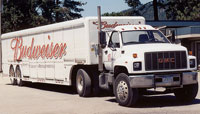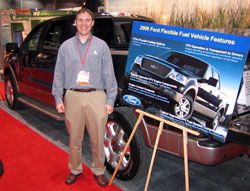Three industry leaders will be holding a media conference on Tuesday to “separate fact from fiction on the myth of ethanol’s role in rising gas prices.” The three are  American Farm Bureau Federation President Bob Stallman,
American Farm Bureau Federation President Bob Stallman,  Renewable Fuels Association President Bob Dinneen, and
Renewable Fuels Association President Bob Dinneen, and National Corn Growers Association vice president Jon Doggett. Farm Bureau is coordinating the telephone conference call for reporters because “of all the factors influencing increasing gas prices, the use of ethanol as a fuel additive is having the least effect, but yet is being reported as the main contributor. In reality, the phase-out of MTBE, high crude oil prices and the petroleum industry’s pricing tactics are the true culprits hiking gas prices.”
National Corn Growers Association vice president Jon Doggett. Farm Bureau is coordinating the telephone conference call for reporters because “of all the factors influencing increasing gas prices, the use of ethanol as a fuel additive is having the least effect, but yet is being reported as the main contributor. In reality, the phase-out of MTBE, high crude oil prices and the petroleum industry’s pricing tactics are the true culprits hiking gas prices.”
Okay, even as a farm media person I have to say it would be a lot better if they got someone a little less biased to vouch for them. How about a private sector economist or industry analyst? Someone not on the corn/ethanol payroll, in other words. I’m on your side, folks – just trying to help here.
This Bud’s For Biodiesel
 A downtown Kansas City distributor for Anheuser-Busch is now delivering Bud by biodiesel. United Beverage Company is fueling its fleet of 22 diesel delivery trucks with a blend of 20 percent biodiesel, according to a press release from the National Biodiesel Board. The vehicles will fill up at a nearby Valero station, the area’s first biodiesel retail outlet. On Friday, NBB joined with the Kansas City Regional Clean Cities Coalition, Maher Oil, the City of Kansas City and the Sen. Jim Talent (R-MO) to celebrate the grand opening of the pump.
A downtown Kansas City distributor for Anheuser-Busch is now delivering Bud by biodiesel. United Beverage Company is fueling its fleet of 22 diesel delivery trucks with a blend of 20 percent biodiesel, according to a press release from the National Biodiesel Board. The vehicles will fill up at a nearby Valero station, the area’s first biodiesel retail outlet. On Friday, NBB joined with the Kansas City Regional Clean Cities Coalition, Maher Oil, the City of Kansas City and the Sen. Jim Talent (R-MO) to celebrate the grand opening of the pump.
Blend Your Own Ethanol
 Choosing ethanol at the pumps just got easier for motorists fueling up at Sioux Valley Coop (SVC) in Watertown, S.D. The coop recently installed blender pumps which will allow customers to essentially blend their preferred level of ethanol fuel.
Choosing ethanol at the pumps just got easier for motorists fueling up at Sioux Valley Coop (SVC) in Watertown, S.D. The coop recently installed blender pumps which will allow customers to essentially blend their preferred level of ethanol fuel.
SVC in partnership with Glacial Lakes Energy, LLC ethanol plant is hosting a “Yellow Dime” promotional event Friday to officially launch the blender pump offering. Motorists who chose ethanol-blended fuels during the promotion will receive one yellow dime back for every gallon of ethanol they purchase. The yellow dimes handed out during the event will circulate throughout the community, showing the impact of corn and ethanol production on the local economy.
That’s a neat promotion, which is being sponsored in part by the South Dakota Corn Growers Association.
(Read the full release here)
McCain on Ethanol
 Senator John McCain was in Iowa today – the largest ethanol producing state – doing a little back-peddling on his previous strong opposition to ethanol as being too costly to produce, but still taking a strong stand against subsidies. According to the Des Moines Register, McCain said ethanol should have to compete without government help. “I think if ethanol is a viable option, it can compete, as it certainly can with $70-a-barrel oil. I think it ought to be something that ought to be carefully examined.”
Senator John McCain was in Iowa today – the largest ethanol producing state – doing a little back-peddling on his previous strong opposition to ethanol as being too costly to produce, but still taking a strong stand against subsidies. According to the Des Moines Register, McCain said ethanol should have to compete without government help. “I think if ethanol is a viable option, it can compete, as it certainly can with $70-a-barrel oil. I think it ought to be something that ought to be carefully examined.”
McCain has not decided yet if he will run for president again in 2008.
Latest Plant Plans
Minnesota – US BioEnergy Corporation announces plans for a 100 million gallon per year (mgy) ethanol plant near Springfield, Minn. (Yahoo press release)
Kentucky – Bluegrass BioEnergy LLC, developers of a $95 million ethanol plant in Fulton are hoping to start construction next month on the facility that would begin production 14 months later. (AP/Duluth News Tribune)
Iowa – Tama will be the site of a new ethanol plant built by Alpha Holdings. (Marshalltown Times-Republican)
New Sugarcane Could Yield More Ethanol
 An Australian company has patented a way to make sugarcane plants that can produce more ethanol. Farmacule BioIndustries says the key component in producing the new plants is a “patented gene activation technology, INPACT (‘In-Plant Activation technology’),” according to a company release.
An Australian company has patented a way to make sugarcane plants that can produce more ethanol. Farmacule BioIndustries says the key component in producing the new plants is a “patented gene activation technology, INPACT (‘In-Plant Activation technology’),” according to a company release.
According to Mel Bridges, Farmacule Chairman, the Company’s research team successfully modified sugarcane plants using the INPACT technology (and cellulases in the plant) to enable highly efficient conversion of cellulose into fermentable sugars after crushing. The remaining sugars can then be used efficiently to produce bioethanol, leaving the sucrose untouched and available for the consumer sugar market.
Farmacule announced the new technology at BIO 2006 this week.
Ford F150 Lease Winner
 One of the many contests at the BIO 2006 trade show was a 2 year lease on a Ford F150 that’s E85 capable.
One of the many contests at the BIO 2006 trade show was a 2 year lease on a Ford F150 that’s E85 capable.
The lucky winner is Kyle Beery, ADM, who I just happened to run into while I was wandering around the trade show area. He is one happy camper.
I also got to interview Ford’s Midwest Public Affairs Manager, David Reuter. He talks about the latest E85 vehicles offered by the company and their support for the continued growth and development of alternative fuel availability.
You can listen to my interview with David here:  David Reuter Interview (5 min MP3)
David Reuter Interview (5 min MP3)
Biodiesel Bill
 The Iowa Senate passed a bill this week to create a biodiesel tax credit for retailers, as well as include biodiesel in the 25 percent of petroleum displacement the state would require by 2020. The amended bill now moves back to the state House, which passed an earlier version by a vote of 92-7. National Biodiesel Board officials are hoping other states might follow Iowa’s lead. “Iowa is demonstrating bold leadership by promoting renewable biodiesel and ethanol,” said Joe Jobe, National Biodiesel Board CEO. “It is positioning itself as a significant energy exporter and could become the Texas of the Midwest.”
The Iowa Senate passed a bill this week to create a biodiesel tax credit for retailers, as well as include biodiesel in the 25 percent of petroleum displacement the state would require by 2020. The amended bill now moves back to the state House, which passed an earlier version by a vote of 92-7. National Biodiesel Board officials are hoping other states might follow Iowa’s lead. “Iowa is demonstrating bold leadership by promoting renewable biodiesel and ethanol,” said Joe Jobe, National Biodiesel Board CEO. “It is positioning itself as a significant energy exporter and could become the Texas of the Midwest.”
Val-E Deal
 US BioEnergy Corporation will soon be the sole owner of Val-E Ethanol near Ord, Nebraska. According to a company release, they have entered into a letter of intent with the minority owners of Val-E to acquire the remaining ownership interest of the company. Last month US BioEnergy announced its intention to acquire the majority ownership of Val-E and Platte Valley Fuel Ethanol, LLC. Val-E Ethanol has an expected completion date of summer, 2007.
US BioEnergy Corporation will soon be the sole owner of Val-E Ethanol near Ord, Nebraska. According to a company release, they have entered into a letter of intent with the minority owners of Val-E to acquire the remaining ownership interest of the company. Last month US BioEnergy announced its intention to acquire the majority ownership of Val-E and Platte Valley Fuel Ethanol, LLC. Val-E Ethanol has an expected completion date of summer, 2007.
California Dreaming
 Xethanol Corporation is setting its sites westward. According to a company release, they have hired a west coast venture capitalist to explore strategic growth opportunities for Xethanol in the large and expanding California ethanol market. Christopher d’Arnaud-Taylor, Xethanol’s Chairman and Chief Executive Officer, says they are currently focused on the company’s east coast regional roll out (see previous post), but they want to be ready to tackle the California market when the time comes. “California’s demand for ethanol is about one third of the current US market. Almost all of the 900 million gallons of ethanol consumed in California in 2004, equal to more than $1.3 billion, was imported by rail or ship, mainly from Corn-Belt ethanol producers. California presently hosts production of only 8 million gallons per year at two small-scale operations, although there are ambitious plans to build several more plants that will primarily use corn as feedstock. We expect that California will be a huge opportunity for us to deploy cutting edge technologies for the conversion of low cost biomass and other waste streams to ethanol.”
Xethanol Corporation is setting its sites westward. According to a company release, they have hired a west coast venture capitalist to explore strategic growth opportunities for Xethanol in the large and expanding California ethanol market. Christopher d’Arnaud-Taylor, Xethanol’s Chairman and Chief Executive Officer, says they are currently focused on the company’s east coast regional roll out (see previous post), but they want to be ready to tackle the California market when the time comes. “California’s demand for ethanol is about one third of the current US market. Almost all of the 900 million gallons of ethanol consumed in California in 2004, equal to more than $1.3 billion, was imported by rail or ship, mainly from Corn-Belt ethanol producers. California presently hosts production of only 8 million gallons per year at two small-scale operations, although there are ambitious plans to build several more plants that will primarily use corn as feedstock. We expect that California will be a huge opportunity for us to deploy cutting edge technologies for the conversion of low cost biomass and other waste streams to ethanol.”


